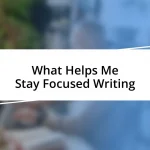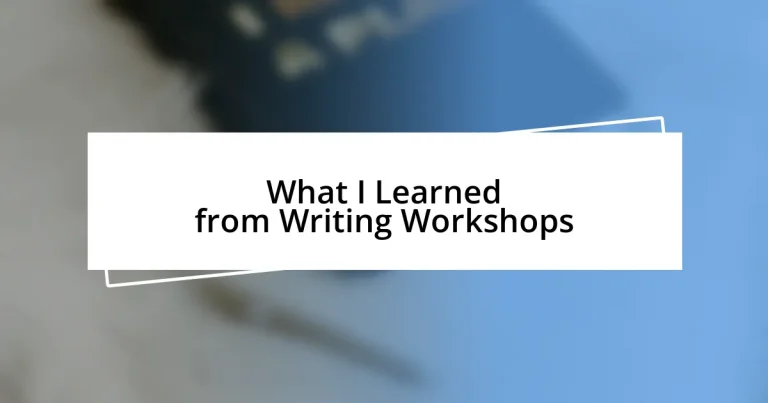Key takeaways:
- Writing workshops foster a supportive community, boosting confidence and transforming the writing experience.
- Different workshop types—critique, thematic, and informal—offer unique benefits, enhancing skills in various ways.
- Key skills developed include constructive criticism, self-editing, and creative flexibility, crucial for growth as a writer.
- Engagement strategies, such as setting personal goals and embracing vulnerability, enhance the workshop experience and foster connections.
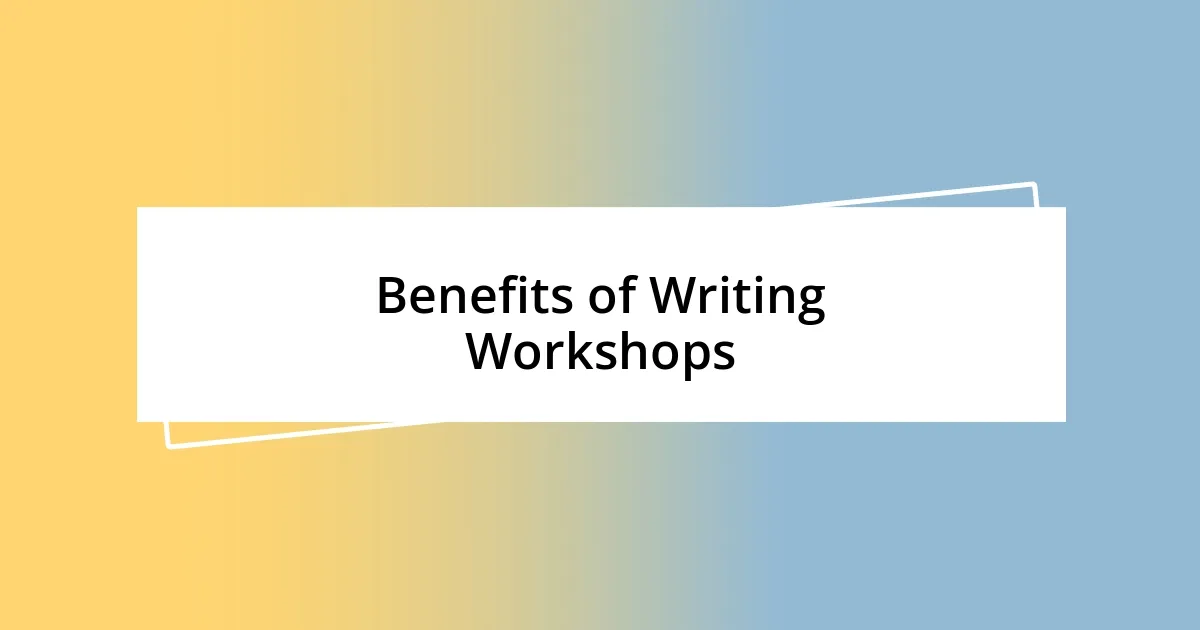
Benefits of Writing Workshops
One of the most significant benefits of writing workshops is the community they foster. I remember my first workshop; it felt exhilarating to be surrounded by fellow writers who shared my passion and struggles. The feedback from peers not only boosted my confidence but also sparked a camaraderie that made the writing journey less solitary. Have you ever felt alone in your writing? This sense of belonging can be transformative.
Workshops also hold a mirror to our writing, helping us see our blind spots more clearly. I can recall a moment when a participant pointed out a repetitive phrase in my story that I had overlooked for weeks. It was like a light bulb switched on for me! That kind of constructive criticism is invaluable, pushing us to refine our craft in ways we might not achieve alone. Isn’t it intriguing how others can sometimes see our writing more clearly than we do?
Moreover, writing workshops often introduce us to diverse perspectives and styles. I once took a workshop led by a poet, and her approach to language opened my eyes to the power of imagery in storytelling. It’s incredible how learning from others can broaden our horizons, isn’t it? Embracing different voices not only enriches our writing but encourages us to experiment and grow beyond our comfort zones.
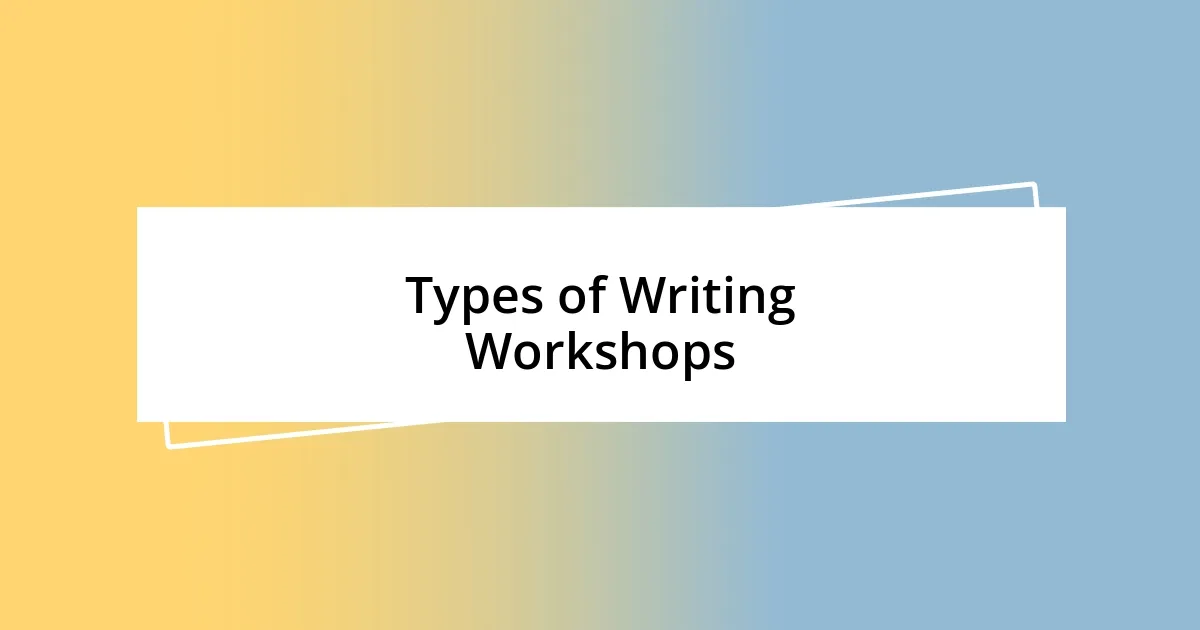
Types of Writing Workshops
Writing workshops come in various types, each offering unique benefits. For instance, the traditional critique workshop focuses on peer feedback, where writers share their work and receive constructive criticism. I remember sitting in a circle, my heart racing, as my work was discussed. The mixed reactions opened my eyes to different interpretations and helped me grow exponentially as a writer.
Another popular type is thematic workshops, often centered around specific genres or techniques. I once joined a workshop dedicated to character development. It was fascinating to dive deep into what makes a character compelling. The exercises we did helped me flesh out my characters in ways I hadn’t considered before—like actually interviewing them to understand their motivations!
Additionally, there’s the informal writing group, which is more about community and encouragement than formal critique. During my time in one such group, we shared our writing, but we also connected over coffee and conversation. I cherished these moments where the atmosphere felt less like an evaluation and more like a celebration of our shared love for storytelling.
| Type of Workshop | Description |
|---|---|
| Critique Workshop | Focuses on peer feedback, promoting growth through constructive criticism. |
| Thematic Workshop | Centers around specific genres or techniques, fostering in-depth exploration. |
| Informal Group | Encourages community and sharing in a relaxed environment, often prioritizing support over critique. |
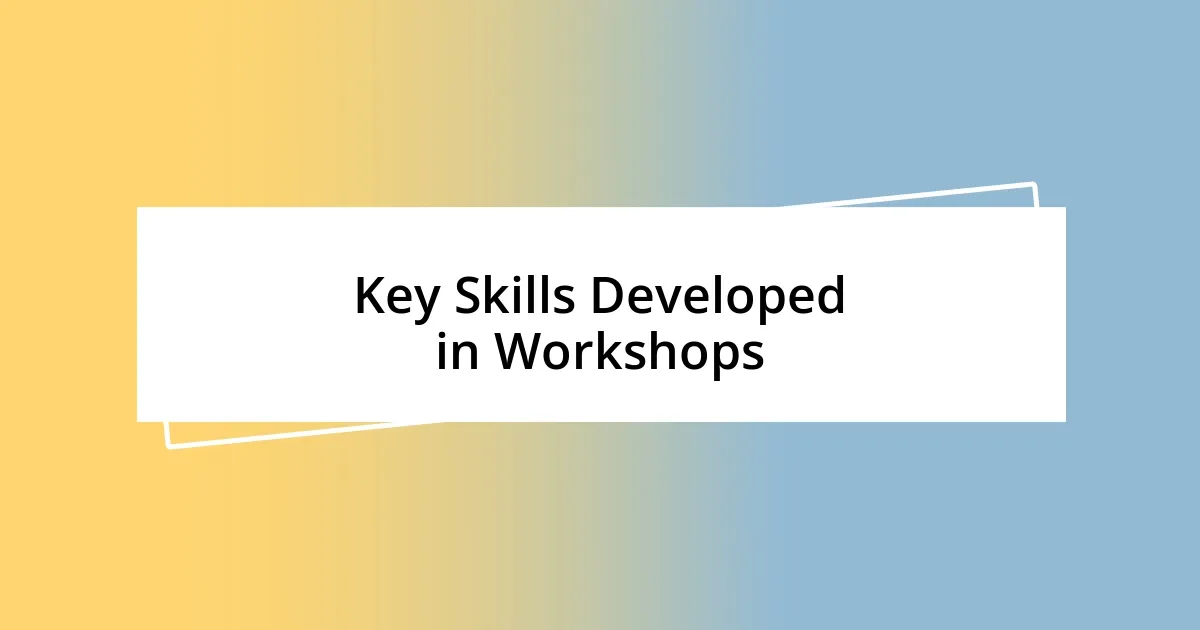
Key Skills Developed in Workshops
The skills I’ve developed in writing workshops have been pivotal to my growth as a writer. One experience that stands out to me was when we focused on storytelling techniques. I vividly recall experimenting with pacing in a piece I wrote. The feedback I received emphasized the importance of balancing action and reflection, ultimately transforming my storytelling approach. It’s fascinating how such workshops cultivate our creative muscle, urging us to push boundaries and experiment boldly.
Here are some key skills honed through writing workshops:
- Constructive Criticism: Learning to give and receive feedback sensitively and effectively.
- Creative Flexibility: Adapting to various styles and genres through diverse perspectives.
- Self-Editing: Developing a critical eye for one’s own work, helping to identify areas for improvement.
- Collaboration: Building connections that encourage teamwork and shared learning.
- Confidence Building: Gaining the courage to present our work publicly and embrace vulnerability.
Each skill intertwines, shaping not just our craft but also our approach to writing as a lifelong journey.
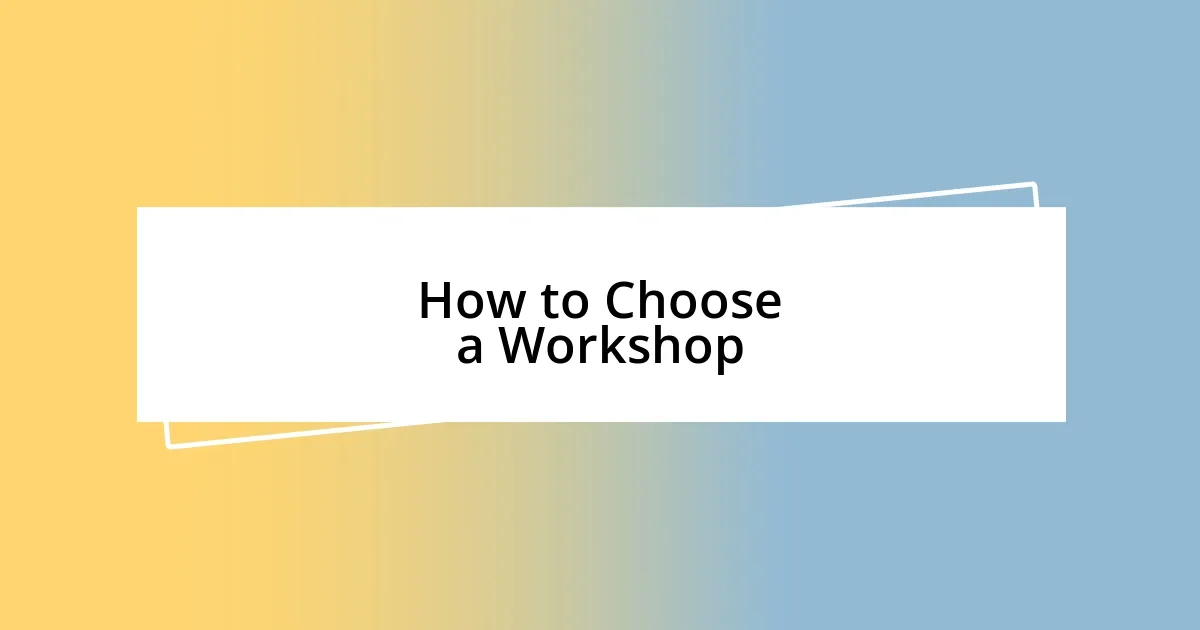
How to Choose a Workshop
When choosing a writing workshop, consider your specific goals as a writer. For instance, I’ve often found that aligning my objectives with the workshop’s focus leads to a more fulfilling experience. Whether you’re looking for structured feedback or a space to brainstorm new ideas, knowing what you want can significantly narrow down your options.
Another key factor is the facilitator’s experience. I recall attending a workshop led by a published author, which made all the difference for me. Their insights and real-world advice were invaluable, enriching our discussions and adding depth to feedback. Ask yourself: What do you want to learn from the facilitator’s expertise, and how can it influence your writing journey?
Lastly, think about the group dynamics. I’ve participated in workshops where the camaraderie was palpable, which encouraged openness and vulnerability. Have you ever felt stifled by a competitive or critical environment? Finding a supportive group can transform your creative process, making it easier to take risks and share your work confidently.
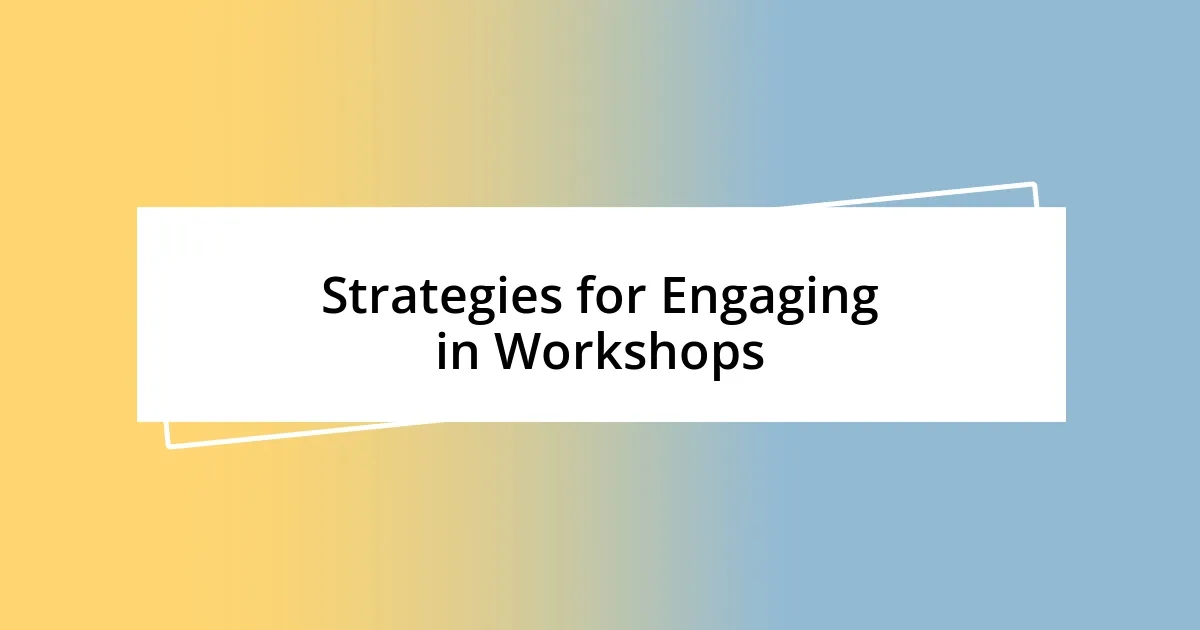
Strategies for Engaging in Workshops
Engaging effectively in workshops often starts with actively embracing vulnerability. I remember feeling nervous the first time I shared my work; however, once I opened up, I found that everyone else felt similarly. This shared experience of being a little scared yet excited created a bond among us that allowed for deeper, more honest feedback. Have you ever noticed how sharing personal stories can foster a stronger connection? It certainly did for me.
Moreover, prioritizing participation can dramatically enhance your experience. In one workshop, I made it a point to not just listen but to ask questions and contribute to discussions. This approach not only kept me engaged but also ignited relationships with fellow writers. The reciprocal nature of this interaction taught me that being present and involved not only fuels my learning but also encourages others. So, how can you make your voice heard in a workshop setting?
Lastly, I’ve found that setting personal goals for each session can help maintain focus and motivation. Before attending a recent workshop focused on character development, I decided my goal was to understand how to create more relatable characters. With that in mind, everything I listened to and worked on felt purposeful. I left feeling accomplished and inspired. What do you hope to achieve? Setting such intentions can transform your workshop experience into a powerful tool for growth.
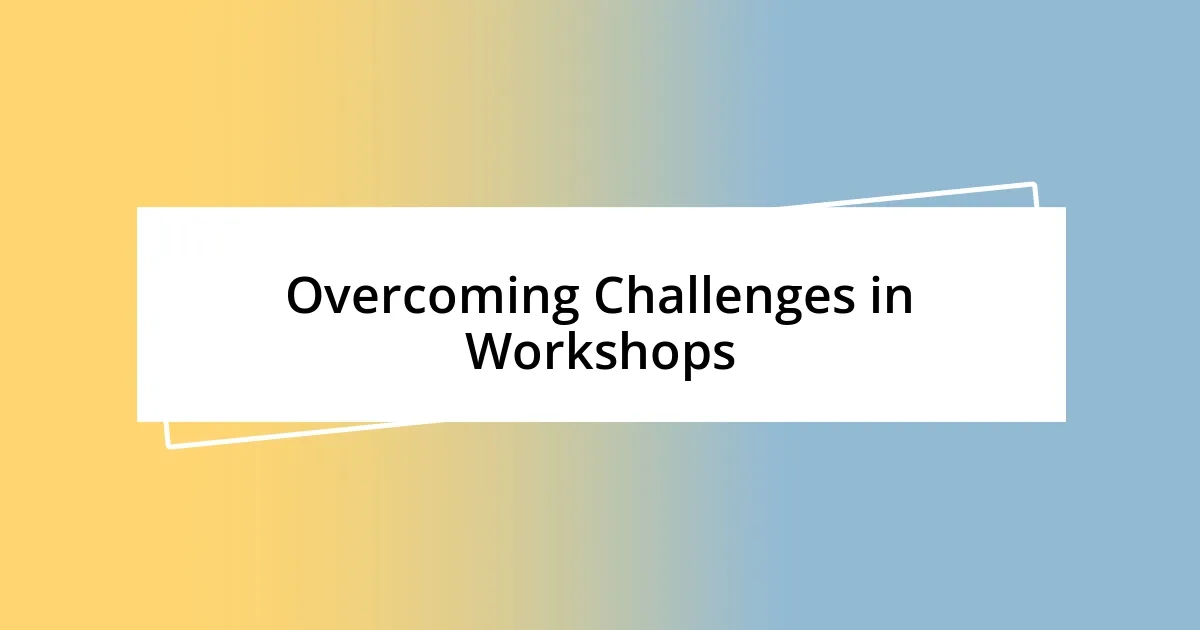
Overcoming Challenges in Workshops
Overcoming challenges in writing workshops often begins with confronting our fears. I remember joining a workshop where the first assignment was to read my piece aloud. My heart raced. But with each word I spoke, I noticed a shift—not just in me, but in the room. That moment of vulnerability broke the ice, and everyone else opened up too. Isn’t it funny how a little courage can create a ripple effect?
Another hurdle I’ve faced is the fear of criticism. During one session, a participant shared a piece that received constructive feedback, and I could see their disappointment. I learned that criticism doesn’t have to feel personal; it’s an opportunity to grow. That realization transformed how I viewed feedback. I began to embrace it, looking for gems of insight rather than dwelling on the sting of harsh words. Have you ever re-evaluated your perspective on feedback?
Finally, managing time during workshops can be daunting. I recall one instance where we had to critique several pieces within a short timeframe. It felt overwhelming at first, but I soon discovered that prioritizing my thoughts and focusing on key aspects made the process more manageable. This taught me the importance of efficiency in both writing and feedback. How do you handle the pressure of time in a creative setting?
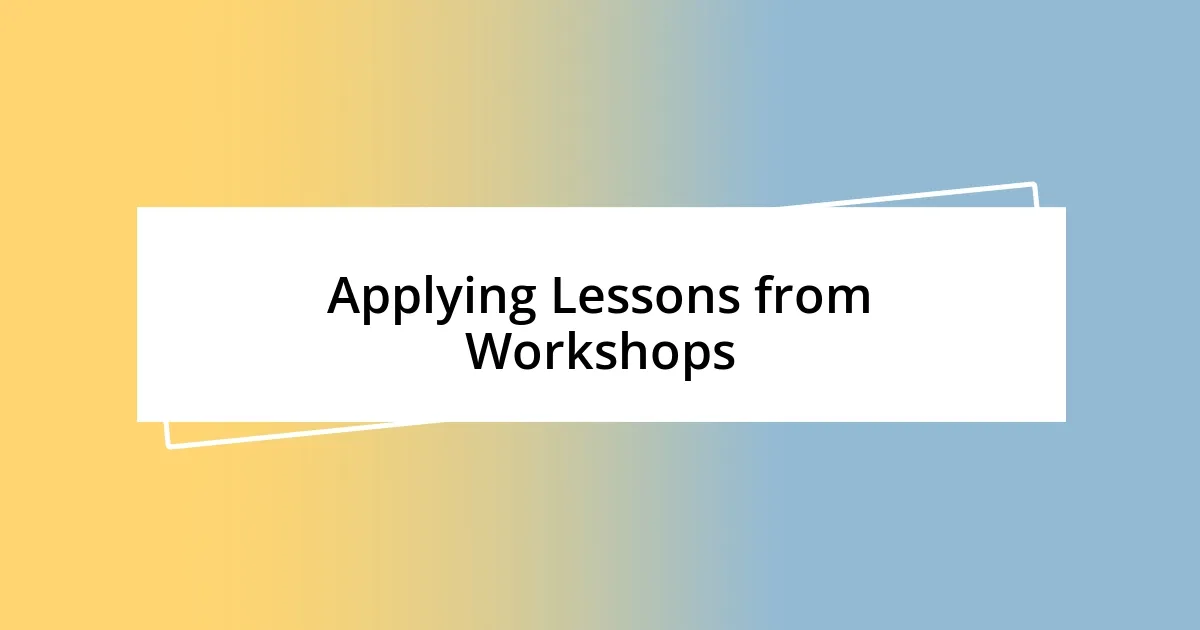
Applying Lessons from Workshops
Applying the lessons learned from workshops means taking the insights and feedback into the real world. I remember a time when I attended a session focused on storytelling techniques. It wasn’t just about absorbing information; I took that knowledge and implemented it in my next short story. The narrative structure I learned helped create a more compelling plot. Have you ever experienced the thrill of seeing your writing evolve because of a lesson learned in a workshop?
Another key lesson is the importance of practice. I once participated in an exercise where we had to write a character sketch in just ten minutes. At first, I felt the pressure of time, but afterward, I realized that those quick exercises can ignite creativity. I began incorporating timed writing sessions into my routine. It’s fascinating how those short bursts of focused writing can lead to breakthroughs in my narrative style. How might frequent practice shift your writing approach?
Lastly, maintaining a growth mindset is critical when applying what I’ve learned. After a particularly challenging workshop, I found myself reflecting on my writing weaknesses instead of my strengths. Yet, this introspection became a driving force for subsequent projects. Embracing my flaws helped me approach my work with curiosity rather than fear. Isn’t it amazing how recognizing our vulnerabilities can become a powerful catalyst for growth?







